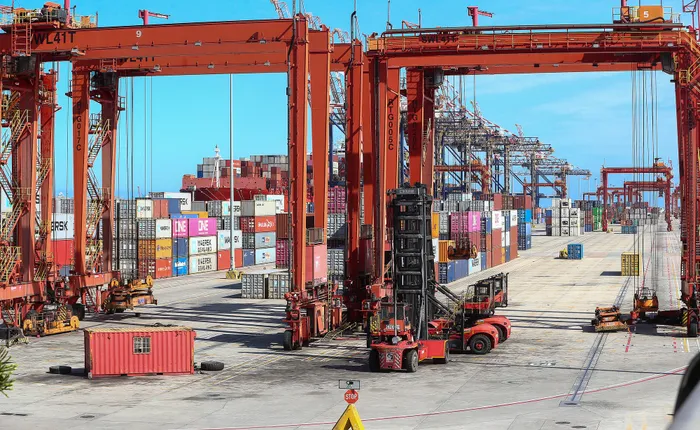Tender process for Transnet’s Durban Container Terminal 2 was rigorous and transparent
International Container Terminal Services Inc. (ICTSI) was announced as the preferred bidder for the Durban Container Terminal 2 almost two years ago. However Transnet, ICTSI and Maersk, the losing bidder, are engaged in a legal battle which returns to court at the end of April.

International Container Terminal Services Inc. (ICTSI) was announced as the preferred bidder for the Durban Container Terminal 2 almost two years ago. However Transnet, ICTSI and Maersk, the losing bidder, are engaged in a legal battle which returns to court at the end of April.
Image: Leon Lestrade/ Independent Newspapers
IT HAS been almost two years since Transnet announced International Container Terminal Services Inc. (ICTSI) as the preferred bidder for the Durban Container Terminal 2, and exactly a year after this was reaffirmed by independent third-party financial consultants who verified the rigour and fairness of the tender process.
Yet the implementation of the public/private partnership between Transnet and ICTSI is still in the balance, costing the South African economy billions in lost opportunities. The delay is a result of the losing bidder Maersk seeking to nullify Transnet’s awarding of the contract to ICTSI on entirely spurious grounds
The Durban Container Terminal Pier 2 concession process was a rigorous, transparent, and competitive bidding exercises – on par with best-in-class processes that ICTSI has taken part in across the world.
ICTSI is a multinational specialist company that successfully runs port operations across 32 ports in 19 countries. It operates in some of the world's largest and most dynamic economies, including China, Brazil, Indonesia, the Philippines, Argentina and Australia as well in smaller, complex jurisdictions such as Madagascar and the Democratic Republic of Congo.
ICTSI’s global revenues for the 2024 financial year rose 15% to $2.74 billion (R50 billion), and net income for the year rose 66% to $849.8 million (R15.54 billion).
In an attempt to subvert the outcome of the bidding process, losing bidder Maersk has not only lodged a legal challenge on meritless grounds, but it also waited almost a year after the announcement was made before launching the challenge.

Hans-Ole Madsen the Regional Head of International Container Terminal Services Inc. says they are ready to implement critical improvements at the container terminal, enhancing the efficiency and reliability of one of South Africa’s most important trade gateways.
Image: Supplied
Their argument? That ICTSI should not have passed the earlier Request for Qualification (RFQ) stage based on their own interpretation of one financial metric, a metric that even more to the point was never a pass/fail test in any portion of the process.
The process leading up to the awarding of the container terminal concession was extensive and methodical. It began with a Request for Interest on August 17, 2021, followed by the issuance of a Request for Qualification by the Transnet Board of Directors on February 11, 2022, inviting potential partners for a 25-year special purpose vehicle to operate the Durban container terminal.
The closing date for RFQ submissions was April 12, 2022. During this submission, ICTSI (as well as all interested parties) disclosed its financial standing, including the now-contested solvency metric.
By August 9, 2022, the Transnet Board had evaluated all applicants and shortlisted ten qualified entities, including ICTSI and Maersk’s subsidiary, APM Terminals. At this stage, Transnet’s auditors had no concerns regarding ICTSI’s financial eligibility. The shortlisted bidders were then invited to submit formal proposals.
When the final bids were assessed, ICTSI emerged as the clear winner, offering $618 million (approximately R12 billion) for the concession, while Maersk bid $515 million (R9.2 billion). ICTSI also scored 100% on Transnet’s evaluation, compared to Maersk’s 83%.
Based on these results, Transnet’s Board approved ICTSI as the preferred bidder on April 11, 2023, and the decision was made on July 3, 2023. Maersk was officially notified of its unsuccessful bid three days later, and the announcement was made public on July 18, 2023.
After July 2023, Transnet commissioned external consultants to do a further round of assessment on ICTSI – over and above the legal requirements of the tendering process. The independent third-party consultants, GrowthStone, found that:
“Based on the financial due diligence review, ICTSI is expected to be a robust participant in the Durban Container Terminal Pier 2 private sector participation project. From a financial risk standpoint, the company is in a very strong position to add value to the project while being able to withstand volatilities in both global and local markets through its strong balance sheet, well-diversified business portfolio, and extensive access to capital across a broad range of sources. Coupled with effective capital management practices and a well-crafted gearing strategy, ICTSI is positioned to be a strong and reliable strategic partner to Transnet in the [Durban Container Terminal Pier 2] operation.”
On the basis of this, Transnet reaffirmed ICTSI’s selection as the preferred bidder.
Maersk only then filed an urgent interdict on March 11, 2024 based on ICTSI’s solvency ratio — some nine months after the final decision had been made and almost two years since the RFQ notice.
Maersk misleadingly framed its challenge as though Transnet had only confirmed ICTSI’s bid in March 2024, when in fact, the process had been concluded nine months prior. This legal manoeuvre appears to be nothing more than an attempt to disqualify ICTSI on an arbitrary technicality, disregarding the fact that ICTSI’s bid was superior both in financial and operational terms.
ICTSI used a recognised industry method to calculate solvency during the RFQ process, based on market capitalisation, which is widely accepted in financial evaluations. Maersk is now attempting to impose its own choice of definition of solvency—one that would disqualify even some of the world’s largest corporations, including Apple, for the same bidding process.
Moreover, financial solvency is just one metric among many used to assess a company’s financial capacity to execute a major investment project. ICTSI has a proven track record of running successful port operations globally, and its financial standing is robust. Attempting to reduce its capability to a single financial ratio is both misleading and disingenuous.
The ongoing legal dispute has significant consequences for South Africa’s trade efficiency. Transnet is upgrading equipment at the Durban harbour, but the port needs a world-class operator to drive efficiency, transparency, and competitiveness. Unlike Maersk, ICTSI is not vertically integrated into shipping and port operations, making it an impartial player that can fairly serve all shipping lines using the Durban container terminal.
Every delay caused by Maersk’s legal challenge impacts South Africa’s exporters and importers, stalling much-needed improvements at the terminal. If Maersk succeeds in disqualifying ICTSI in favour of its own bid, Transnet stands to lose R2 billion in investment, an outcome that would be entirely unjustifiable given the integrity of the bidding process.
ICTSI is ready to implement critical improvements at the container terminal, enhancing the efficiency and reliability of one of South Africa’s most important trade gateways. Maersk’s challenge is a distraction that serves only to delay progress at the expense of the country’s economic interests.
Hans-Ole Madsen, is the Regional Head of ICTSI. His views does not reflect those of the Sunday Tribune or IOL.
